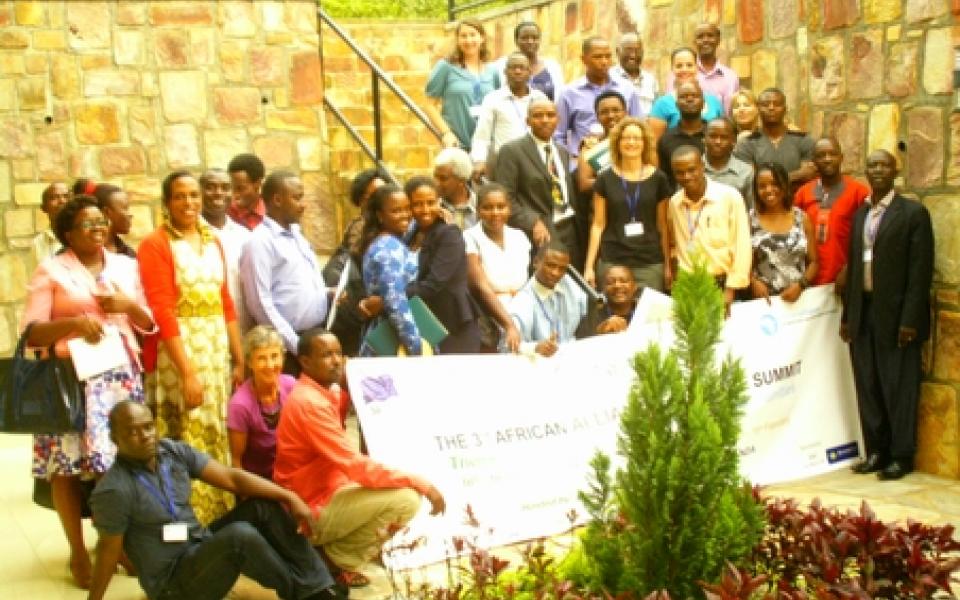
Dear Colleagues,
Greetings of peace and blessing from URI Africa. I am very happy to inform you that URI Africa took active role at the 3rd African Alliance for Peace Summit held in Kigali, Rwanda, from Feb. 16 to 19, 2014 on the theme of “Promoting Peace Education in our Communities.” Peacebuilders from different parts of Africa participated in the summit.
The summit was hosted by the Shalom Education for Peace – Rwanda, in partnership with Rwandan National Unity and Reconciliation Commission, International Alert Rwanda, Institute of Research and Dialogue for Peace, World Vision Rwanda, United Religions Initiative Africa , ALARM, GPPAC East Africa, MCC Rwanda and Burundi, Young Peace-builders Initiative, International Centre on Nonviolence, Labenevolencija, Mercy Ministries International/Great Lakes, ADRA Rwanda, Search for Common Ground Rwanda, the Institute for Justice and Reconciliation, International Centre of Nonviolence, Teachers Without Boarders, Nobleza Hotel and Rwanda Air.
During my opening remarks, I expressed solidarity and partnership on behalf of URI Africa in the mission and vision of the African Alliance for Peace Summit. I also expressed the support of URI for the purpose of the Global Alliance for Ministries & Infrastructures for Peace. Throughout the summit, I highlighted on the role of religions for peace and introduced URI’s work to the attendees.
I also expressed the importance of the Golden Rule; the summit participants agreed to promote the Rule in their respected countries as a common project of African Alliance for Peace and to join URI Africa and Interfaith Peace-building Initiative (URI CC in Ethiopia) in proclaiming April 5th as the Golden Rule Day. In the declaration of the Summit the Golden Rule, International Day of Peace, and World Interfaith Harmony Week was also included as common action of the Alliance.
On the occasion of the summit, URI Africa presented the Peace Award to Dr. Geoffrey Thomas Harris in appreciation and acknowledgment of his outstanding contribution in promoting peace education in Africa and for establishing the Department of Conflict Resolution and Peace Studies at the University of KwaZulu Natal, South Africa.
There, many students have completed their Master’s and doctorate degrees in Peace Studies. Dr. Thomas Harris was also awarded for being a living example and embodiment of the philosophy of nonviolence, as practiced by Ghandi and Martin Luther King, Jr.
URI Africa made an appeal for the end of violence in Central Republic Africa, Egypt, South Sudan, and in countries throughout the world where there is political unrest and conflict. URI Africa calls on all Africans to join our hands together and ask national governments to significantly invest in the development of skills and infrastructure dedicated to the peaceful resolution of conflict.
While in Rwanda, I met with the Mayor of Kigali, along with the Director of Rwanda National Unity and Reconciliation Commission. I informed the mayor about the Third African Alliance for Peace Summit. I also introduced him to URI and our work in the past in Rwanda in bringing the different religious leaders to work together on the issue of reconciliation and peace. I also informed him about Mayors for Peace and Charter for Compassion, and kindly asked him to support the Golden Rule Day and to join the Charter for Compassion in making Kigali a compassionate city.
The mayor appreciated the work of URI in Africa and the rest of the world and agreed to proclaim the Golden Rule Day and to join Charter for Compassion in making Kigali a compassionate city. During my meeting with the mayor, I also acknowledged, on behalf of URI Africa and Mayors for Peace, the great work of the mayor and people of Kigali City in keeping the city green and very clean. Kigali is the cleanest, safest, fastest and most liveable city in Africa.
The three-day summit gave participants the opportunity to share their experiences, establishing a network and ideas about developing ministries and infrastructure for peace in Africa. As a result of attending the AAP, participants will:
• Have a deeper understanding of the concept of peace education
• Be aware of different approaches used by peace educators in their schools and communities
• Propose appropriate and effective curriculum (content and teaching methods) for peace education programmes in Africa
• Develop practical tools to evaluate peace education programmes
• Gain strategies on how to include the whole community in peace education
Background information on African Alliance for Peace
The Africans who attended the Third Global Summit of the Global Alliance for Ministries and Departments of Peace in Japan in 2007, inspired by the summit and its call for ministries and departments of peace, formed the African Alliance for Peace (AAP).
The AAP has since expanded from the four countries represented at the Japan Summit (Rwanda, Senegal, Uganda, and South Africa) to include members from Sierra Leone, Ethiopia, Kenya, Ghana, Nigeria, Democratic Republic of Congo, and Cameroon, and continues to grow. The vision of the AAP is to support the creation of a culture of peace and nonviolence in all African countries, including calling for structures in government and civil society to support a culture of peace.
The first summit was held in Accra, Ghana in May 2008, and the second in Abuja, Nigeria, in October 2010. Recognizing the importance of peace education in moving towards the realisation of the AAP ‘s vision, the members of the network who met in Cape Town in October 2011 agreed to organize the next summit under the central theme of “Promoting Peace Education within our Communities.” The meeting chose Kigali to be the host of the third summit and recommended Shalom Educating for Peace (SEP) to organize the summit.
May Peace Prevail in Africa
In peace and gratitude,
Mussie Hailu

